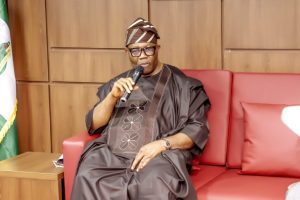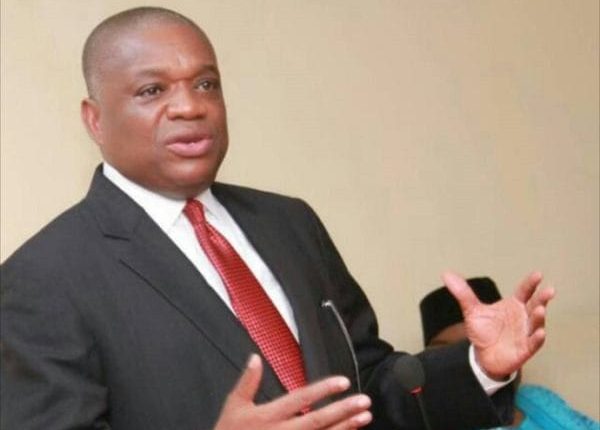WHY SENATORS WANTED TO IMPEACH AKPABIO, ORJI KALU SHEDS LIGHT ON HOW IT WAS ABORTED
By
Saawua Terzungwe
Former governor of Abia State and senator representing Abia North, Orji Uzor Kalu, yesterday revealed that the recent attempt to impeach Senate President Godswill Akpabio was thwarted through the intervention of lawmakers committed to protecting the integrity and stability of the 10th Senate.
Speaking with journalists yesterday at the National Assembly Complex in Abuja, Kalu confirmed that rumours of a plot to unseat Akpabio were not unfounded, but said the plan was neutralised before it could gain traction.
“Though there were attempts, we didn’t allow that to happen. That is why I always say we are one big family, and it is not going to happen. The Senate is united behind its leadership,” he said.
He stressed that the upper chamber remains focused on its constitutional duty of lawmaking and oversight, while supporting President Bola Ahmed Tinubu’s administration in addressing the country’s socio-economic challenges.
“Whatever the problem is, the Senate is more interested in making laws that will help President Tinubu overcome the economic difficulties our people are going through. We are more interested in the people. The legislations we are making are pro-people, and we are focused on ensuring Nigerians can eat three times a day,” Kalu said.
Sources familiar with internal discussions said the impeachment attempt was not an organised rebellion but a loose alliance of disenchanted lawmakers, both within the APC and the opposition.
Some lawmakers reportedly felt sidelined in committee appointments and accused Akpabio of concentrating power in a small circle of loyalists. Others complained about insufficient consultation on sensitive issues such as budget appropriation and national security briefings.
Growing unease in the upper chamber
Kalu’s comments came after weeks of speculation about unease within the Senate. Reports had suggested that some lawmakers, particularly in the ruling All Progressives Congress (APC), were uncomfortable with Akpabio’s leadership style.
In July 2025, tension escalated after Akpabio and Senate Leader Opeyemi Bamidele (APC, Ekiti Central) reportedly clashed during a closed-door session. The disagreement, sources said, centred on procedural issues and leadership communication but later snowballed into a broader internal dispute seen as a sign of discontent within the APC caucus.
According to insiders, the misunderstanding began after Akpabio unilaterally announced that the Senate would proceed on its annual recess, a decision that surprised some principal officers. Critics argued that such a decision should have been discussed collectively.
A senator, who spoke on condition of anonymity, said the matter degenerated into a heated exchange over whether the Senate had fulfilled its constitutional obligation of sitting for at least 181 legislative days in the year.
While Bamidele’s observation was said to be technically correct, many senators were surprised that he challenged the Senate President so openly, an unusual show of dissent within the ruling party.
Political observers interpreted the development as a growing dissatisfaction with Akpabio’s handling of internal affairs.
This was not the first time reports of friction between Akpabio and key members of the Senate had surfaced.
In November 2024, there were claims of a near-physical confrontation between Akpabio and Bamidele, allegations which the Senate Leader’s office swiftly dismissed as “fake news” aimed at discrediting the upper chamber.
In a statement issued then by the Directorate of Media and Public Affairs of Bamidele’s office, he denied ever engaging in physical or verbal altercations throughout his political career, describing the story as fabricated by detractors intent on sowing division in the Senate.
Nevertheless, political watchers noted that the recurring reports of tension within the APC caucus reflected deeper ideological and political rifts.
Analysts said the Senate, traditionally seen as the stabilising force in Nigeria’s democracy, appears to be struggling with internal power plays reminiscent of previous assemblies.
Akpabio’s rise and the challenge of consensus
Senator Akpabio, a former Akwa Ibom governor and ex-Minister of Niger Delta Affairs, emerged Senate President in June 2023 after securing the endorsement of President Tinubu and key APC stakeholders.
His victory over Senator Abdulaziz Yari of Zamfara was widely viewed as a triumph for the Tinubu camp, which sought to entrench loyalty and stability in the legislative arm.
However, barely two months into the 10th Senate, reports surfaced of a plot to impeach Akpabio. Some senators accused him of running the chamber as a “rubber stamp” of the executive arm, fearing that under his leadership, the Senate might lose its independence.
Although Akpabio dismissed such claims as “politically motivated,” analysts said they underscore an enduring debate about the legislature’s autonomy in Nigeria’s presidential system.
ad
Kalu’s mediating role
Senator Kalu, known for his influence in both political and business circles, is said to have played a key role in defusing the recent crisis.
As a two-term former governor and senior APC figure, Kalu commands respect across party lines. Sources said he worked alongside senior lawmakers such as Ali Ndume (APC, Borno South), Ahmad Lawan (APC, Yobe North), and Adams Oshiomhole (APC, Edo North) to quietly de-escalate tensions.
Their efforts reportedly centred on appealing for unity and warning that a leadership crisis could destabilise the Senate and send negative signals at a time of national economic strain.
A senator told Daily Trust on condition of anonymity that, “Kalu is one of those who believe in institutional stability. He may disagree privately with Akpabio, but he understands that an impeachment at this time would send the wrong message.”

Echoes of past power struggles
Nigeria’s Senate has a history of leadership tussles that have destabilised its operations.
The 5th Senate (1999–2003) witnessed the successive removal of Evans Enwerem and Chuba Okadigbo, while the 8th Senate (2015–2019) led by Bukola Saraki was marked by sharp divisions after his emergence defied his party’s preference.
That crisis triggered prolonged tension between the executive and legislature, with Saraki’s leadership constantly threatened by impeachment rumours.
Akpabio walking a tightrope – Analysts
A political analyst, Jackson Lekan Ojo, told Daily Trust in a telephone interview yesterday that Akpabio “is walking a tightrope.”
“He has to be careful balancing loyalty to the executive with defending the autonomy of the legislature to avoid a bad outcome,” Ojo said.
He noted that Akpabio’s close alignment with President Tinubu, though consistent with the APC’s Renewed Hope agenda, could erode legislative checks and balances if not properly managed.
“By foiling the plot against Akpabio, the Senate may have restored temporary calm, but underlying tensions remain. The challenge ahead is consolidating unity while maintaining genuine independence, a balance that has eluded many parliaments in Nigeria’s democratic history,” he added.
Another analyst, Aminu Yakudima, said the failed plot reflects the volatility of Nigeria’s political system, where shifting loyalties and power realignments are common.
“The stakes are particularly high given the current economic hardship and widespread discontent. But an unstable Senate could weaken policy consistency and delay key reforms such as the 2026 budget, energy sector restructuring, and constitutional amendments,” he said.


